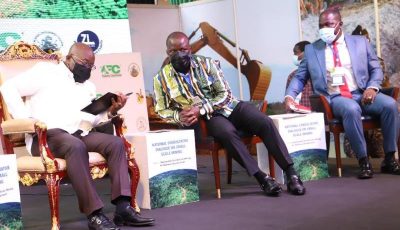Warning: Undefined array key "dirname" in /home/anapuafm/public_html/wp-content/themes/anapuafm/include/plugin/filosofo-image/filosofo-custom-image-sizes.php on line 133
Warning: Undefined array key "extension" in /home/anapuafm/public_html/wp-content/themes/anapuafm/include/plugin/filosofo-image/filosofo-custom-image-sizes.php on line 134
Government to lift ban on small-scale mining on December 17
GNA – The Government will on Monday, December 17, 2018, lift the ban on small-scale mining for about 900 miners whose mining concessions had been validated and successfully gone through the vetting process.
In view of that, government would on Monday publish the names and concessions of licensed miners, who could legally mine in both print and electronic media outlets so that the security agencies could monitor their activities.
The guidelines of the new policy framework would also be published in the media and made available on all the notice boards of the district, municipal and metropolitan assemblies across the country.
However, government was emphatic that illegal mining, otherwise known as “galamsey” is still illegal and that the joint Military / Police taskforce would continue to track them down.
Professer Kwabena Frimpong-Boateng, the Chairman of the Inter-Ministerial Committee on Illegal Mining, announced this in Accra on Friday at the outdooring of Government’s new policy framework on mining, to regularize mining activities in the country.
The Minister noted that due to the gravity of the destruction of the environment by illegal mining, the country would require a colossal amount of $29 billion dollars to reclaim the degraded mined out areas.
The government placed a moratorium on all forms of small-scale mining in March, 2017, for a period of six months and extended it indefinitely after the expiration, in order to have sufficient time to sanitise the mining sector.
Prof. Frimpong-Boateng, also the Minister of Environment, Science, Technology and Innovation, used the occasion to outline the various reforms to be implemented in the new policy framework.
Some of the key components include: Government to provide alternative livelihoods for artisanal miners, mining equipment that are not registered and tagged with tracking devices would be confiscated to the state, fabrication and transportation of mining equipment known as “Changfan” would not be allowed.
Additionally, drones and other tracking devices had been acquired to monitor and enforce mining regulations, licensed and registered artisanal small-scale miners would be organised into community co-operatives and provided with validated mining concessions to work legitimately under the supervision of district mining committees, while government ensured transparency in mining resource management in the country.
The Minister said there would be formation of Geological Investigation Technical Steering Committee for the Minerals Commission and Ghana Geological Survey Authority and resourced to provide improved geology for small-scale mining operations to enable them to identify suitable mining lands to prevent indiscriminate mining.
Other reforms are: Computer software had been developed to help regulate the activities of regulatory agencies, such as the Minerals Commission, Water Resources Commission and the Environmental Protection Agency to monitor the life-cycle of mining and mining related activities, while regulatory agencies would undergo reformation to make them more efficient.
“Therefore there should be no any logical reason for anyone in Ghana to engage in illegal mining,” Prof. Frimpong-Boateng emphasised.
He commended the Ghana Association of Small-Scale Miners for their co-operation over the past 19 months when the ban was placed on small-scale mining and expressed appreciation to professors at the George Grant University of Science and Technology for their contribution in coming out with the policy framework.
Mr Kenneth Ashigbey, the Convener for the Coalition Against Galamsey, in an interview with the Ghana News Agency, urged the media to critically examine the new policy framework and monitor its implementation to the letter.
He asked politicians to avoid playing politics with mining, especially during the 2020 general elections, and rather work collectively for sustainable mining in the interest of the present and future generations.
GNA


